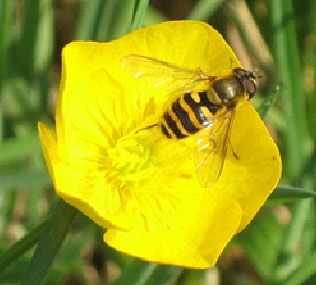New Research Shows that Organic Farming benefits Insect Biodiversity, Insect-Flower Interactions and Pollination of Wild Plants
Posted on: 22 June 2011
New research just published by ecologists at Trinity College Dublin, has shown that organic farming benefits insect biodiversity, insect-flower interactions and pollination of wild plants.
The study by PhD student Eileen Power and principal investigator Dr Jane Stout of the School of Natural Sciences, TCD was published in the Journal of Applied Ecology.
Modern farming, with its reliance on agrichemical inputs, threatens wild plants and the insects such as bees and hoverflies that visit their flowers. Some wild plants rely on their insect visitors to transfer pollen and thus act as pollinators. The insects rely on the plants as a food resource, and together they form an interconnected web of interactions that are ecologically and economically important. The value of insect pollination has been estimated to be worth at least €50 million per year to the agricultural industry in Ireland.

The native Irish hoverfly is an important pollinator.
The TCD research demonstrated that insect-flower interaction networks on organic farms were larger, and that there were more flowers on organic farms which attracted a higher number of bees, compared with non-organic and conventional counterparts. The study, which compared insects and plants on 10 organic and 10 conventional dairy farms in central and southern Ireland, also found that there was a higher rate of pollination of hawthorn growing in the hedgerows of organic fields. Since hawthorn berries are an important food resource for many native birds during the winter, there are potential knock-on benefits of organic farming on other native Irish species which have yet to be investigated. However, the study highlighted that insect-flower interaction networks in these intensively managed dairy pastures contained far fewer species than semi-natural grasslands. In addition, because there was little overlap between the species of insect that visited each plant species, the networks were ecologically vulnerable to species loss.
The study concluded that organic farming, although not the solution in its present form, can benefit insect biodiversity, insect-flower interactions and pollination of wild plants.
The study was published in the Journal of Applied Ecology (see: http://onlinelibrary.wiley.com/doi/10.1111/j.1365-2664.2010.01949.x/abstract)
